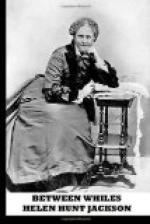“An’ a big difference to her a’ her life,” replied Isabella, warmly.
“Ay, wife,” said John, “if it fa’s out as ye hope; but it’s main uncertain countin’ on the book-knowledge. There’s some it draws up an’ some it draws down; it’s a millstone. But the lass is bright; she’s as like you as two peas in a pod. If ye’d had the chance she’s had—”
Rising color in Isabella’s face warned John to stop. It is a strange thing to see how often there hovers a flitting shadow of jealousy between a mother and the daughter to whom the father unconsciously manifests a chivalrous tenderness akin to that which in his youth he had given only to the sweetheart he sought for wife. Unacknowledged, perhaps, even unmanifested save in occasional swift and unreasonable petulances, it is still there, making many a heartache, which is none the less bitter that it is inexplicable to itself, and dares not so much as confess its own existence.
“It’s a better thing for a woman to make her way i’ the world on the book-learnin’ than to be always at the wheel an’ the churn an’ the floors to be whitened,” replied Isabella, sharply. “An’ one year like another, till the year comes ye’re buried. I look for Bel to marry a minister, or maybe even better.”
“Ye’d a chance at a minister yersel’, then, my girl,” replied the wise John, “an’ ye did not take it.” At which memory the wife laughed, and the two loyal hearts were merry together for a moment, and young again.
Little Bel had, indeed, even before the Charlottetown schooling, had a far better chance than her mother; for in her mother’s day there was no free school in the island, and in families of ten and twelve it was only a turn and turn about that the children had at school. Since the free schools had been established many a grown man and woman had sighed curiously at the better luck of the youngsters under the new regime. No excuse now for the poorest man’s children not knowing how to read and write and more; and if they chose to keep on, nothing to hinder their dipping into studies of which their parents never heard so much as the names.
And this was not the only better chance which Little Bel had had. John McDonald’s farm joined the lands of the manse; his house was a short mile from the manse itself; and by a bit of good fortune for Little Bel it happened that just as she was growing into girlhood there came a new minister to the manse,—a young man from Halifax, with a young bride, the daughter of an officer in the Halifax garrison,—gentlefolks, both of them, but single-hearted and full of fervor in their work for the souls of the plain farming-people given into their charge. And both Mr. Allan and Mrs. Allan had caught sight of Little Bel’s face on their first Sunday in church, and Mrs. Allan had traced to her a flute-like voice she had detected in the Sunday-school singing; and before long, to Isabella’s great but unspoken pride, the child had been “bidden to the manse for the minister’s wife to hear her sing;” and from that day there was a new vista in Little Bel’s life.




